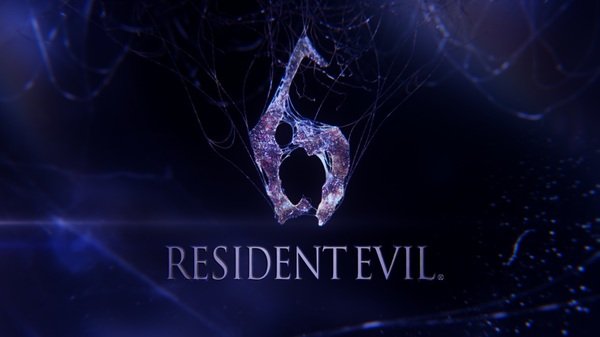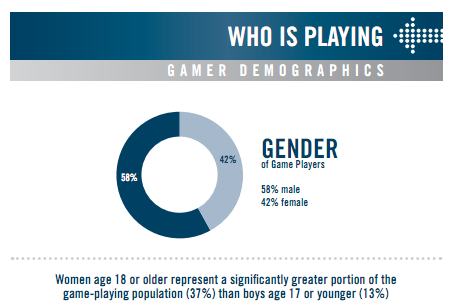Last week saw the disbanding of the Frag Dolls, a group of female professional gamers that was formed in 2004 to demo and promote Ubisoft games as well as to participate in professional competitions (they became the first all-female clan to win a pro circuit tournament–CPL–in 2006). The first team of seven women were originally recruited via Craigslist and were hand chosen by Ubisoft by what seem to have been Western, heteronormative standards of beauty as well as their gaming skills. The original personal profiles for the women on the Frag Dolls site included sexy cartoon drawings of the women as well as a series of posed beauty shots (but none of them actually gaming). The vital statistics portion of the profile even listed basic physical characteristics ahead of the things that the women themselves seemed to be most proud of, their game and media favorites. This characterization carried  over into some of the more staged press photos with the team being portrayed as rebellious “children” wreaking havoc around a pink doll house.
over into some of the more staged press photos with the team being portrayed as rebellious “children” wreaking havoc around a pink doll house.
According to Valkyrie (Amy Brady), the group’s original Frag Doll, their mission has always been to inspire more women to play games and to form a positive image of women in the games industry and the competitive games circuit. In addition to their Ubisoft promotional work and competitive gaming, the Frag Dolls have worked diligently to increase the presence and visibility of women in the games industry. In 2010 the Frag Dolls issued their first call for their new internship program, the Cadette Academy. The Cadette Academy served to bring together women who were interested in both the games industry and competitive gaming and offer them personal and professional networking opportunities.
When the team was first formed in 2004 the environment surrounding video games was one that was based on the assumption that girls (and women) didn’t play games. Although it barely seems possible, it was also an environment that was less receptive to the idea of female inclusion than the community is even today. In their farewell blog post (that Ubisoft quickly deleted/archived), the Frag Dolls wrote:
When the team was created back in 2004, we weren’t really sure what the Frag Dolls should be, and certainly never imagined what it would become. But we knew that it hinged upon the common misconception that video games were boys’ toys. The essential appeal of the Frag Dolls emerged from those delightful moments of surprise when people discovered that women like us not only loved video games, we were REALLY GOOD at them.
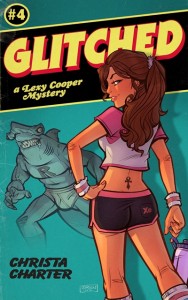 This attitude and the actual manifestations of it is something that female members of the industry have more recently started to write about online and in conference panels. Christa Charter (formerly Trixie360 of Microsoft’s Xbox Live division), author of the Lexy Cooper mystery series, has spoken about on her own blog in a post entitled “Sexism in Games–A Mea Culpa” as she talks about her own experience with (and participation in) in sexism in the games industry. Through Charter’s post we are able to see the myriad reasons that women continue to work in the industry and participate in practices that would seem to be detrimental to their own interests. Charter writes:
This attitude and the actual manifestations of it is something that female members of the industry have more recently started to write about online and in conference panels. Christa Charter (formerly Trixie360 of Microsoft’s Xbox Live division), author of the Lexy Cooper mystery series, has spoken about on her own blog in a post entitled “Sexism in Games–A Mea Culpa” as she talks about her own experience with (and participation in) in sexism in the games industry. Through Charter’s post we are able to see the myriad reasons that women continue to work in the industry and participate in practices that would seem to be detrimental to their own interests. Charter writes:
They wanted me to bring hot chicks. Eye candy. So the devs would have something pretty to look at and flirt with. And I did it. Year after year. No, I wasn’t Heidi Fleiss, but I participated in making these women objects…Why didn’t I report the dick dangler, the coworker who took upskirt photos of me on a business trip, or the exec who who hinted I’d be safe from the next round of layoffs if I put out? Why didn’t I have the partner developer thrown out of a party when he shoved his tongue down my throat? Why didn’t I call out every ass-grabbing, talk to my tits, sexist shithead?
Because I was afraid of being “that woman.” The [one] that the internet jumps all over. I knew my career was fucked the minute I went through that door, so I choose silence and the status quo. I was a coward and I didn’t even make an attempt to make things better for myself or any other woman trying to do their thing in the games industry.
But we call bullshit on Charter’s claim that she was a coward. Not only does it take extreme courage to even go to work every day in an environment like that when one is constantly being bombarded with sexism and misogyny, but she was also behind the female Xbox community Gamerchix that gave female gamers (like Sam) a virtual space to talk to other women about not only the games that they played (and to arrange times to play together) but also a space to talk about the sexism that they experienced in the broader Xbox community. Even then she was attacked by some of the male community members for building a community that “excluded” men.
N.B. Charter’s Lexy Cooper series is set in the video game industry with characters who are amusing caricatures of folks in the industry, with Agent 54 (aka “Penis Gravitas”) being Sam’s favorite nemesis for Lexy. And the fourth book in the series, Glitched, revolves around a “Rape Shark” webcomic and its creator meeting his end in a gruesomely appropriate manner. Definitely a fun read worth checking out.
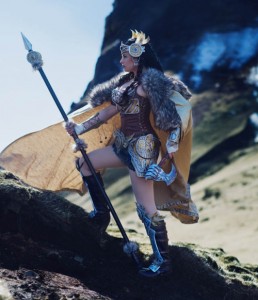 Charter’s blog post came as a response to Meagan Marie’s post “What would you do if you weren’t afraid?”, written in response to an incident with a cosplayer at PAX and the burning question of whether or not cosplay equals consent when the said cosplay is revealing or otherwise titillating. Meagan Marie, who is both Community & Communication Manager at Crystal Dynamics and a professional cosplayer) goes on to detail the treatment that she and other female cosplayers find themselves subjected to at conventions and online when they speak out against the sexism and misogyny that they encounter in the games and cosplaying communities. Specifically in her post, after a confrontation with a member of the press who had asked a female Tomb Raider cosplayer a sexual and sexist question on camera, Meagan Marie asks herself (and her readers) the question “What would you do if you weren’t afraid?” For her the answer is to write the post that she is writing because (in her words) “I’ve decided I’m going to start standing up for myself in order to be more frequently treated like [a person].”
Charter’s blog post came as a response to Meagan Marie’s post “What would you do if you weren’t afraid?”, written in response to an incident with a cosplayer at PAX and the burning question of whether or not cosplay equals consent when the said cosplay is revealing or otherwise titillating. Meagan Marie, who is both Community & Communication Manager at Crystal Dynamics and a professional cosplayer) goes on to detail the treatment that she and other female cosplayers find themselves subjected to at conventions and online when they speak out against the sexism and misogyny that they encounter in the games and cosplaying communities. Specifically in her post, after a confrontation with a member of the press who had asked a female Tomb Raider cosplayer a sexual and sexist question on camera, Meagan Marie asks herself (and her readers) the question “What would you do if you weren’t afraid?” For her the answer is to write the post that she is writing because (in her words) “I’ve decided I’m going to start standing up for myself in order to be more frequently treated like [a person].”
The stories that Meagan Marie shares are familiar. She writes:
Back in 2007 at my very first GDC, I was starry-eyed and overwhelmed to be in the midst of so many people I idolized. So when a drunken CEO of a then-startup pointed to my midsection and said “I want to have my babies in there,” I laughed. I did the same next year when another developer told me that he “didn’t recognize me with my clothes on” after meeting me the night prior at a formal event (to which I wore a cocktail dress). The trend continued for years, and I took it silently each and every time…Because I was afraid to rock the boat. I was afraid to perpetuate rumors that I was uptight, difficult, or had no sense of humor. I was afraid of what I’d heard being said about other women being said about me. So I would stick up for others, but never for myself. Sticking up for others was the right thing to do. I had to be careful not to stick my neck out too far, though.
These stories are familiar because they are all about the fear that women in the industry feel. Fear that they will be ostracized and excluded from the community that they love and want to be a part of if they don’t toe the line, stop rocking the boat, or follow the status quo.
So while women like the members of Frag Dolls, Christa Charter, and Meagan Marie can be seen by some (sometimes even by themselves) as being a being a part of the problem of sexism and misogyny in the games industry the answer isn’t that simple (or simplistic). We can’t look at the issue on the surface and make a judgment (or pre-judge) about them. We have to consider what it is that we can’t see and what it is that some of us don’t want to see, the actions of women (and all historically oppressed groups) may be precipitated by their historical interactions with the community and the marks that they may bear from past battles. As bell hooks writes in All About Love: New Visions:
Contrary to what we may have been taught to think, unnecessary and unchosen suffering wounds us but need not scar us for life. It does mark us. What we allow the mark of our suffering to become is in our own hands.
For us, as women in the games community, the marks that we bear have given us the strength to engage with the community and to become activist in the ways that we are able. For some it is to speak out publicly, for some it is through their art (fiction or cosplay in these cases), and for others it is the power of our presence and steadfastness during the storm. And as we weather this storm together we have to remember that though we all a part of the games community we have to understand that we are not all operating from the same vantage point, nor do we have the same goals and objectives in the end. But what we do all have is the right to engage and express in the ways that we see fit for ourselves without being judged or berated. So if women choose to dress sexily and conform to normative, Western ideals of beauty then that is their choice and as feminists we should be supportive of that choice (as long as they are not being forced into making it or doing so without the necessary information to make an informed decision).
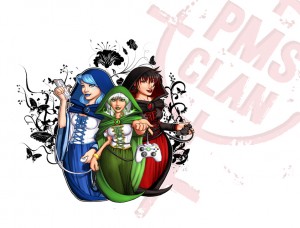 While the authors of this post are in disagreement in whether or not all female clans (like the still existent PMS Clan) specifically are necessary, we are in agreement that exclusive female communities are indispensable. For one of us (we’ll leave you guessing) all female gaming clans are not of the same import that they were a decade ago when the Frag Dolls were formed because there are more visible female gamers today and the writer is of the mind that working within co-ed groups may be a more fruitful way forward if we are to move past the sexism and misogyny that runs rampant in our community (given that the male gamers who are also a part of said groups are allies and sympathetic to our cause). Conversely, the other one of us holds that female clans (and female focused communities) will always be necessary and although the gaming community has progressed somewhat in terms of gender, diversity, and positive female representation there’s still ample work to be done. She believes that while female gamers are more visible today than they were in 2004 they are not as visible as they should or deserve to be and that with the reduction in the number of female clans comes the diminishment of the visibility of female gamers overall.
While the authors of this post are in disagreement in whether or not all female clans (like the still existent PMS Clan) specifically are necessary, we are in agreement that exclusive female communities are indispensable. For one of us (we’ll leave you guessing) all female gaming clans are not of the same import that they were a decade ago when the Frag Dolls were formed because there are more visible female gamers today and the writer is of the mind that working within co-ed groups may be a more fruitful way forward if we are to move past the sexism and misogyny that runs rampant in our community (given that the male gamers who are also a part of said groups are allies and sympathetic to our cause). Conversely, the other one of us holds that female clans (and female focused communities) will always be necessary and although the gaming community has progressed somewhat in terms of gender, diversity, and positive female representation there’s still ample work to be done. She believes that while female gamers are more visible today than they were in 2004 they are not as visible as they should or deserve to be and that with the reduction in the number of female clans comes the diminishment of the visibility of female gamers overall.
Despite our points of disagreement, we do concur on the fact that regardless of whether or not we believe that we need specifically exclusive female gaming clans, we are in agreement that exclusively female gaming communities, especially those that include chat and/or fora, for the purpose of sharing ideas and experiences are still necessary. Recently when we chatted with Brianna Wu, software engineer and developer of Revolution 60, she pointed out that we [as women] should never stop supporting one another or rallying together to make the gaming world a better place for women. For these purposes female only spaces have been historically used as spaces for women to hone their skills so to speak. In these spaces women can come together not only to learn more about specific games and gaming as a whole, but to develop strategies for dealing with some of the problems and situations that arise when gaming and interacting in spaces that are not as safe or as exclusive.
And in the same way that the writers of the piece have some minor disagreement of the level of exclusivity that is needed for female gamers, disagreement exists within the broader games community as well and that is all well and good.


